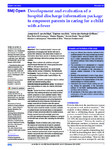Development and evaluation of a hospital discharge information package to empower parents in caring for a child with a fever
| dc.contributor.author | van de Maat, JS | |
| dc.contributor.author | van Klink, D | |
| dc.contributor.author | den Hartogh-Griffioen, A | |
| dc.contributor.author | Schmidt-Cnossen, E | |
| dc.contributor.author | Rippen, H | |
| dc.contributor.author | Hoek, A | |
| dc.contributor.author | Neill, S | |
| dc.contributor.author | Lakhanpaul, M | |
| dc.contributor.author | Moll, HA | |
| dc.contributor.author | Oostenbrink, R | |
| dc.date.accessioned | 2020-09-16T16:21:15Z | |
| dc.date.available | 2020-09-16T16:21:15Z | |
| dc.date.issued | 2018-08 | |
| dc.identifier.issn | 2044-6055 | |
| dc.identifier.issn | 2044-6055 | |
| dc.identifier.other | ARTN e021697 | |
| dc.identifier.uri | http://hdl.handle.net/10026.1/16373 | |
| dc.description.abstract |
<jats:sec><jats:title>Objectives</jats:title><jats:p>First, to explore parents’ views on and experiences of managing their febrile child and to assess their behaviour and needs when in search of information about fever; second, to develop and evaluate a hospital discharge information package about fever in children.</jats:p></jats:sec><jats:sec><jats:title>Design</jats:title><jats:p>Mixed methods: (A) qualitative study with semistructured interviews and a focus group discussion (FGD) and (B) quantitative survey.</jats:p></jats:sec><jats:sec><jats:title>Setting</jats:title><jats:p>Emergency department, non-acute hospital setting and day nursery in Rotterdam, The Netherlands.</jats:p></jats:sec><jats:sec><jats:title>Participants</jats:title><jats:p>Parents of children <18 years (interviews, n=22) parents of children under 5 years (FGD (n=14), survey (n=38)).</jats:p></jats:sec><jats:sec><jats:title>Intervention</jats:title><jats:p>Information package about fever in children (leaflet and website including videos).</jats:p></jats:sec><jats:sec><jats:title>Outcome measures quantitative survey</jats:title><jats:p>Knowledge of fever and confidence in caring for a febrile child (Likert scale 0–5).</jats:p></jats:sec><jats:sec><jats:title>Results</jats:title><jats:p>Parents found fever mostly alarming, especially high fever. Help-seeking behaviour was based on either specific symptoms or on an undefined intuition. When parents did not feel recognised in their concern or felt criticised, anxiety increased as well as the threshold to seek healthcare for future illnesses. Information was needed, especially for situations when the general practitioner or social network were less easily available. This information should be reliable, consistent, available in multiple formats and include advice on management of fever at home and precise referral to medical services. Parents reported improved knowledge about fever (p<0.05) and mentioned improved confidence in caring for a child with fever at home after consulting the information package.</jats:p></jats:sec><jats:sec><jats:title>Conclusion</jats:title><jats:p>Parents of children with a fever visiting the hospital are concerned about specific symptoms or based on an undefined intuition. Rather than telling parents that they should manage their child’s illness at home, healthcare professionals should recognise parental intuition and provide clear information on alarming signs and potential diagnoses to empower parents in the management of their febrile child.</jats:p></jats:sec> | |
| dc.format.extent | e021697-e021697 | |
| dc.format.medium | Electronic | |
| dc.language | en | |
| dc.language.iso | eng | |
| dc.publisher | BMJ | |
| dc.subject | paediatrics | |
| dc.subject | qualitative research | |
| dc.subject | infectious diseases | |
| dc.title | Development and evaluation of a hospital discharge information package to empower parents in caring for a child with a fever | |
| dc.type | journal-article | |
| dc.type | Article | |
| plymouth.author-url | https://www.ncbi.nlm.nih.gov/pubmed/30166298 | |
| plymouth.issue | 8 | |
| plymouth.volume | 8 | |
| plymouth.publication-status | Published | |
| plymouth.journal | BMJ Open | |
| dc.identifier.doi | 10.1136/bmjopen-2018-021697 | |
| plymouth.organisational-group | /Plymouth | |
| plymouth.organisational-group | /Plymouth/Faculty of Health | |
| plymouth.organisational-group | /Plymouth/Faculty of Health/School of Nursing and Midwifery | |
| plymouth.organisational-group | /Plymouth/REF 2021 Researchers by UoA | |
| plymouth.organisational-group | /Plymouth/REF 2021 Researchers by UoA/UoA03 Allied Health Professions, Dentistry, Nursing and Pharmacy | |
| plymouth.organisational-group | /Plymouth/Research Groups | |
| plymouth.organisational-group | /Plymouth/Research Groups/Plymouth Institute of Health and Care Research (PIHR) | |
| plymouth.organisational-group | /Plymouth/Users by role | |
| plymouth.organisational-group | /Plymouth/Users by role/Academics | |
| dc.publisher.place | England | |
| dc.identifier.eissn | 2044-6055 | |
| dc.rights.embargoperiod | Not known | |
| rioxxterms.versionofrecord | 10.1136/bmjopen-2018-021697 | |
| rioxxterms.licenseref.uri | http://www.rioxx.net/licenses/all-rights-reserved | |
| rioxxterms.type | Journal Article/Review |


